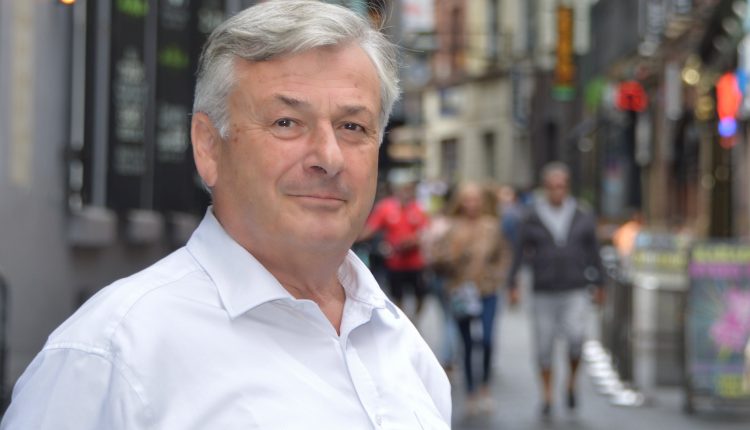Profile: ‘We must keep our graduates in Liverpool’
Gregory Abrams is one of the best-known legal names in Liverpool and played a key role in its renaissance and says keeping talent and building connectivity is essential to maintaining the city’s momentum. Tony McDonough reports
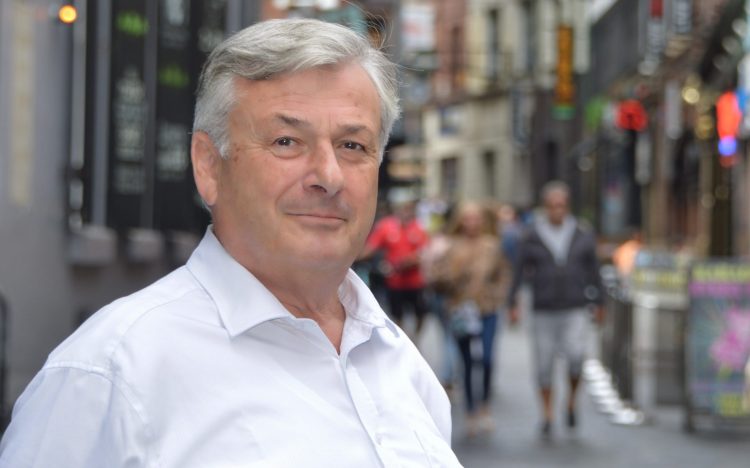
Gregory Abrams started what is now called Gregory Abrams Davidson (GAD) in Liverpool in 1980. Not only has he built a strong legal practice he also also played a critical role in the renaissance of the city.
Now, in an interview with LBN, he says that despite the recent success Liverpool has achieved, such as Capital of Culture and the £1bn Liverpool ONE development, more work is needed to keep the momentum going.
In particular, he explained, it was vital the city created the right opportunities to keep graduates here with the right jobs and attract entrepreneurs. He also warned that Liverpool was falling behind Manchester in terms of investment. It was vital, he said, we had much better connections between the city centre and Liverpool John Lennon Airport.
Still based out of the Mathew Street building he acquired in 1987, 71-year-old Gregory is chief executive of a firm that employs 55 people across three offices in Liverpool and one in London.
READ MORE: Liverpool lawyers advise on transatlantic deal
While many of the city’s law firms have sought grade A space around Old Hall Street and St Paul’s Square, GAD is happy to remain in an area better known for its bars – oh and minor rock and roll band called The Beatles.
“I get in very early in the morning. It can get a bit noisy some days after 4pm but I love it. This is a great building in a great position,” said Gregory.
Cavern Quarter catalyst
He was one of a number of individuals who pushed forward the regeneration of Mathew Street. The Fab Four had made it world famous but by the 1980s the area, like much of the city, was in decline.
What became the Cavern Quarter initiative established a blueprint for the improvement of other parts of the city centre. Its efforts contributed to the city winning the European Capital of Culture accolade in 2003, Gregory believes.
He explained: “In 1987 I bought this building. Cavern Walks had just been built but the rest of the street needed a new lease of life. And I played my part in making that happen. LIverpool was labouring after the riots and the very left wing council. The name Merseyside was not a great name. It needed something new.
“So, with some like-minded people, including Robert Wade Smith and David Backhouse and others, we got together and created the Cavern Quarter. We put five signs on each of the entrances and worked with the excellent council at the time. That was Mike Storey and the Lib Dems.
“The idea was to concentrate on the name Liverpool, identify the city and build on all the history. And we wanted to create a safe, secure place for people to come and live and visit.
“We got better street cleaning, pedestrianisation, improved lighting and a police officer who would patrol. Scottish Power gave us the flashing lights next to Flanagans. Celebrities to come here to promote the area. We got art features restored.
“Top photographer Patrick Litchfield, the Queen’s cousin, came to Mathew Street. He photographed everywhere and that was amazing.
“We promoted the area. We had hanging baskets in the summer, Christmas trees and carol singers in the festive season – it was a massive effort. We got the buildings and all the rubbish sorted out.”
Taking the lead from the Cavern Quarter, the council started to make similar improvements to other parts of the city centre. Locations such as Bold Street and Hope Street were designated as ‘Gold Zones’.
“The idea of making the city great again became a reality,” added Gregory. “The superlatives are never-ending. All of this timed well with the Capital of Culture bid.
“By the time that happened there were a number of areas that were improved. Each area had its own champion. Winning that award was fantastic. We are still getting investment into the city now on the back of that.”
Tailor-made for the law
Gregory was brought up in Garston in south Liverpool. His father and uncles ran tailoring shops called Abrams Brothers. One was located at 85 Lord Street and closed around the time he launched his first law practice.
“After the Second World War everyone wanted to change into civvies and everyone wanted to wear suits,” he said. “I worked at the shop in the 1960s and all the local bands used to come in. My dad had pictures with the Swinging Blue Jeans. Suits were high fashion at that time. But fashions change.”
Young Gregory realised pretty quickly that tailoring wasn’t for him. He explained: “I was never very good with my hands and I am also colour blind. I could sell but I couldn’t buy so it wasn’t for me.”
So real suits were discarded in favour of lawsuits and Gregory enrolled at Liverpool Polytechnic (now Liverpool John Moores University), graduating in 1976. He said: “The course was run by a couple called John and Mary Conkerton who had a great reputation nationally. So the cream from around the country used to come to Liverpool.
“I did my articles (five years) with a firm called Benjamin Kay. When I qualified I worked for a sole practitioner called Gerald Strong. He was ex-army and quite a disciplinarian. I learned a lot there. Much of the early part of my career was spent at the magistrates court. I would be there every day.
“It was a great experience of life. It was like a queue of people in the court. Rex (Makin, legendary Liverpool solicitor) would always be at the front, of course. There were funny moments, tragic moments. And I enjoyed it because I liked meeting people.
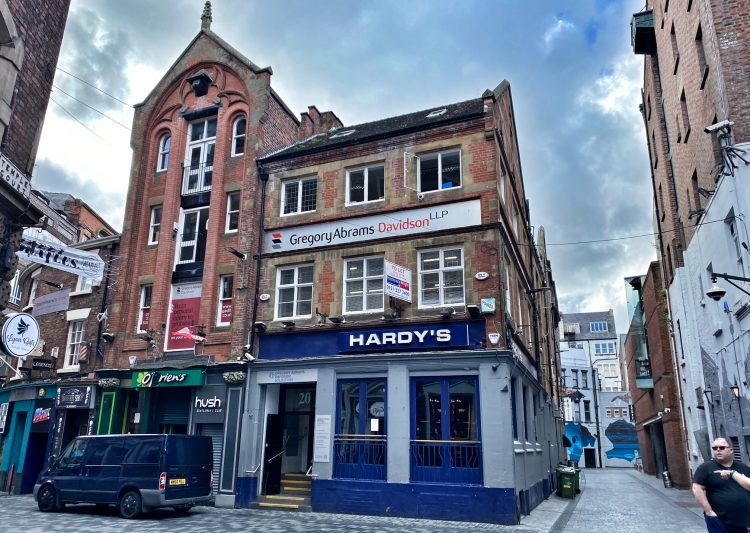
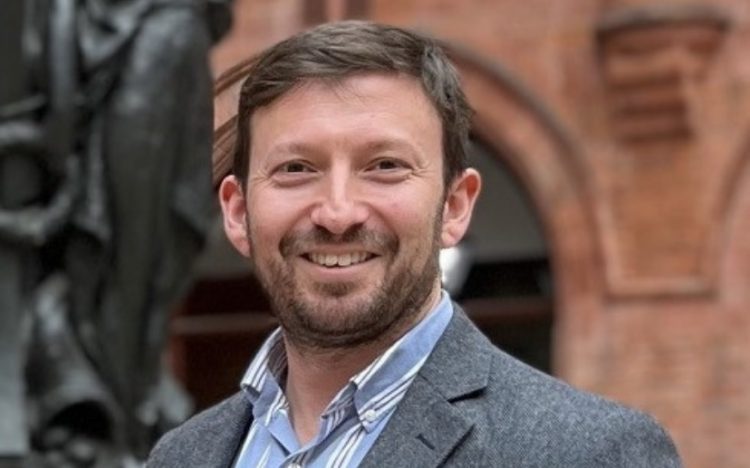
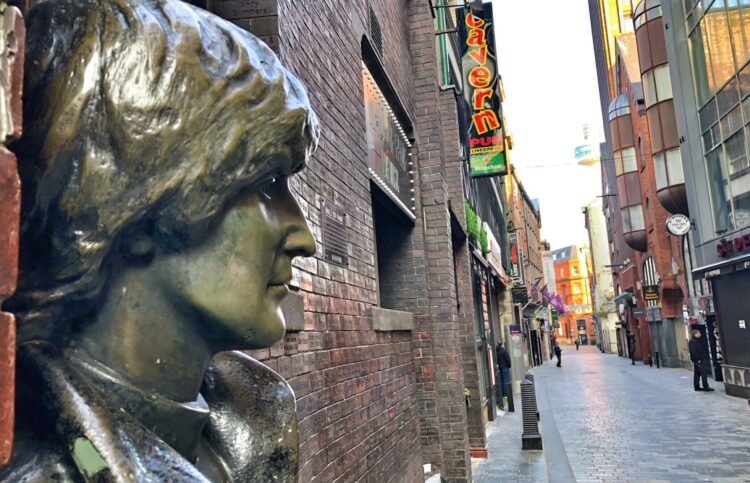
“I started my own practice in 1980. I would have started it even earlier but the Law Society brought in a rule that said you had to be practising for three years to run your own firm. It was something I had always wanted to do.”
He set up shop at 20 Victoria Street, which is now a bar. Having practised as an advocate in criminal and civil courts he moved into social housing welfare. He earned the firm a strong reputation through the 1990s. Gregory played a pivotal role in streamlining the processes for housing disrepair litigation.
Adapting to change
Personal injury was also a big growth area for the firm but changes to the Government’s Legal Aid regime saw outfits such as Gregory Abrams having to quickly adapt. Gregory said: “Every year the Government has cut down the amount of money it has put into it. And a lot of that did make sense. There is no point in them funding personal injury cases.
“They had to work out a different way of doing it and that ended up being no-win, no fee. That was from around 2000. That put the risk onto the solicitors. It was actually very successful for many types of cases.
“Then the insurance industry lobbied the Government and said ‘this is costing us too much money’. So they then restricted the amount of fees for that type of work.”
In 2003 the firm merged with Davidsons Solicitors. This enlarged practice specialised in litigation, personal injury, family, business, commercial and property law. It incorporated into an LLP as of 2006.
Through the 2009 acquisition of London-based commercial and property firm, RJR Law, Gregory Abrams Davidson expanded its offering through the development of a residential conveyancing department in London.
From May 1, 2018, the firm transferred to National Law Partners trading as Gregory Abrams Davidson Solicitors.
Gregory added: “The practice has broadened into more of a commercial or private client type of firm. We now have an office in London that gives us a national perspective. My son, Jonathan Abrams, and my son-in-law, Oliver Joseph, are based down in London.
“I am 71 and I don’t have to worry now about succession. There are good people in the practice so rather than looking back we are looking forward. We talk to other firms, look at opportunities and we take on other skill sets.
“We started offering what is quite a discreet type of work called enfranchisement. It is residents in blocks of flats who want to buy the freehold and manage the properties themselves. That has been quite popular.
“Back in 1980 I would not have imagined having a London office. But the world has got smaller and communications have improved beyond what anybody would have anticipated back then.”
‘We have to work hard to be attractive’
In recent years Gregory has stepped back from his wider regeneration role, with the BID now fulfilling the function that Cavern Quarter once did. He was its final chairman.
But his passion for the city burns as strongly as ever. He is concerned about the recent issues of governance at the city council. However, he is optimistic Liverpool has enough strong fundamentals to allow it to thrive.
“Big investments and plans are not overnight things,” he said. “The Everton stadium, the Tobacco Warehouse were conceived several years ago. There is some wider economic uncertainty and we as a city and a region will be affected. But assuming a new norm settles in then the fundamentals in the city should get back to normal as well.
“I had a conversation with Paul Cherpeau (chief executive of Liverpool Chamber). He had some very interesting things to say. If you look at things on a regional level we lag behind Manchester. They are getting far more investment in Manchester than we are in Liverpool.
“Paul was saying we also need people. How do we keep the graduates in the city? It is a great place to live but does it have the economy to sustain the jobs. And attracting the entrepreneurs and the creators is probably the big challenge for the city.
“Our leaders need to prioritise the future in that way – keeping the young people and growing the jobs and attractiveness, encouraging businesses to invest. To me, that is the key to the future. We can’t rely on European funding any more and we have to work hard to be attractive.
“The £1bn investment from Grosvenor transformed the city. There were downsides to Liverpool ONE. From a commercial point of view the flow of people went a different way. It changed the footfall. Bars were fine but retail outlets around here found it a struggle. On the other hand Metquarter was and is a fabulous place.
“I believe the airport is so important. If someone is coming in for a conference, or if we get the Eurovision Song Contest, they will want to fly into Liverpool Airport. And how do you get there from the city centre? Long-term decisions over infrastructure would be very welcome. The potential for the airport is huge. That is what brings in the people.
“Manchester has a top international airport and Liverpool is a local one. It is great if you want to fly to Spain but if you are coming from the Middle East for a conference you don’t want to be getting a bus into the city.”
Looking to the future
“Our figures at GAD for the past year have been pretty robust because there was a rebound in the economy,” said Gregory. “The Stamp Duty stimulus also helped a lot. That has now subsided and the challenge is to work out what will happen in the next 12 months.
“Legislation for money laundering is so strict. We now have much higher compliance costs so we have to keep the money coming in to cover that. At the end of the day you have to run the business, make a profit and pay everyone’s wages.
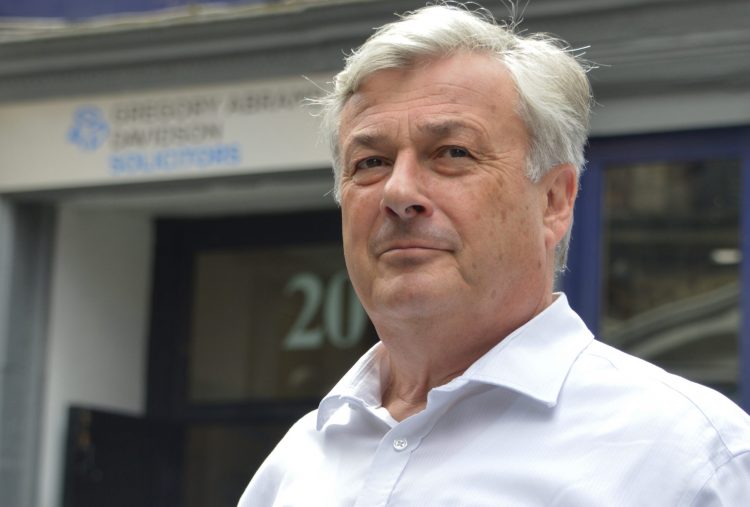
Gregory has been governor of King David School for many years and has served as an executive member and President of Liverpool community foundations and not-for-profit bodies.
He is married with five children and 10 grandchildren. His interests outside work are travel and music and he is also a talented jazz pianist. He is optimistic for the future of the city but says more work needs to be done.
“How do we make the city world class – things such as transport? These are essential things. Everything needs to connect and that has to be the plan,” he explained.
“Our local legal community enjoys a high reputation. Paul Lunt at Brabners did a good job on the Wagatha Christie trial. These things are a good advert for the city and they bring us more business.
“I am Liverpool born and bred and I have always felt strongly for the city. Liverpool has been good for me so why shouldn’t I play my part. And I did.”

